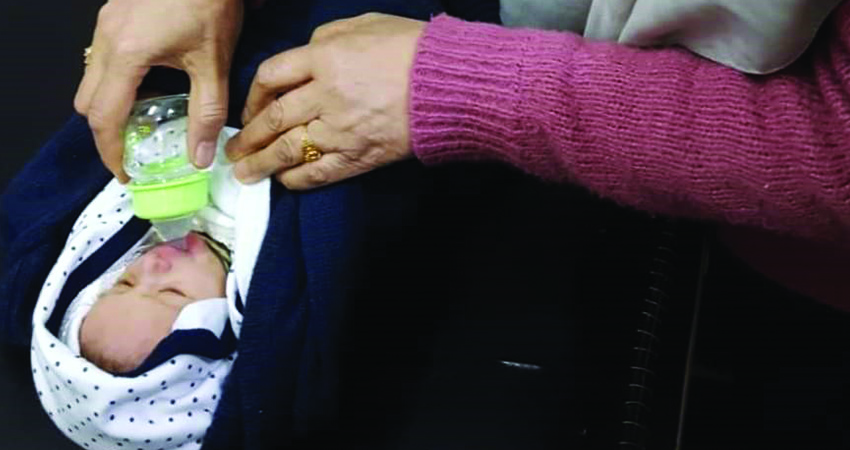Executive summary
An alarming increase in the number of newborns being abandoned in Idlib and northern rural Aleppo under different armed groups’ control has been noticed. STJ documented 40 cases of abandoned infants during 2018 and the first half of 2019 but suggests the true figure to be far higher citing the difficulty in verifying such cases.
Babies were found abandoned in the streets or inside plastic garbage bags, or in travel bags, among them were newborns got left with their umbilical cords attached. In Idlib, 12 abandoned infants died for being too late found or of bad weather.
Poverty was among the main reasons contributed to the rise of infant abandonment in Idlib and northern rural Aleppo, particularly in displacement camps. Another reason is the prevalence of forced and early marriages of minors to foreign fighters, whose identities are often unknown, notably in Idlib. Children from this kind of marriage were mostly abandoned by mothers, especially those whose spouses were killed in combat. Those mothers claim to be unable to provide for their children plus the fact that they can’t registered them in civil records, as witnesses confirmed to STJ.
STJ field researchers warned of sufferings and ill fates await the abandoned babies found alive. It’s quite possible that they will be denied the rights to education and to a nationality, since they are without civil registry. Further, those children have no safeguards against child labor, including the recruitment and use of child soldiers. On top of that, they are rejected by society, which calls them ‘bastards’ or ‘waifs’.
Authorities have made no movement towards providing care for abandoned children. In Idlib, which is mostly controlled by Hayat Tahrir al-Sham/HTS. Several families helped abandoned newborns in foster care, but without being able to be foster parents for them, since the orphan to be registered by the same name of its adoptive parents is not allowed in Islam. However, some families wanted to register their foster child in the province of Hama, but they feared possible arrest by the state’s security forces. Activists cooperated with charitable organizations to take the abandoned babies, who were not fostered, to orphanages and retirement homes. Right activists told STJ that they had sought to obtain the approval of the Salvation Government’s directorate of education to allow the enrolment of abandoned children in schools, but unfortunately it only allowed them to attend classes as ‘listers’, which means without being enrolled.
STJ field researcher reported that demands are already being heard in Idlib that the abandoned children should be enlisted. In June 2019, the preacher of the Abu Dhar mosque in Idlib stressed in a sermon the need for the early recruitment of children for them to be mighty warriors in the future, citing as an example the story of Baibars, who is of unknown parentage.
The situation is not much different in northern rural Aleppo, where there are no specialized institutions provide care for abandoned children or regulate their issues.[1] The scope of the authorities’ responsibility is limited to handling fostering procedures, which include proving the good reputation of the foster, in addition to his ability to register the child in the personal status department in northern rural Aleppo, to guarantee his or her rights, including education.
STJ field researchers reported that not only abandoned children are at risk of being stateless in Idlib and northern rural Aleppo, but also those of known parentage, owing to challenges in gaining access to the regime areas including the fear of arrest.
STJ will prepare a report on this issue in the coming months.
The United Nations Children’s Fund (UNICEF) said in a press statement on March 11, 2019 that 2018 was the deadliest year for the children in Syria. The statement touched on the unclear fate of the foreign fighters’ children and called for the states to take responsibility for children who are their citizens or born to their nationals, and to take measures to prevent children from becoming stateless.[2]
1. Critical number of abandoned infants in Idlib
The province of Idlib has seen a surge in infant abandonment since early 2018. STJ resarchers recorded at least 21 cases of newborns abandonded either in streets, mosques or near residential buildings, 8 of which died either because they were found too late or due to the bitter cold weather. This phenomenon is remarkably spread in Idlib, specifically in the villages and towns of Atme, Arihah, Tell Mannas, Armanāz, Al-Bara and Mishmishan.
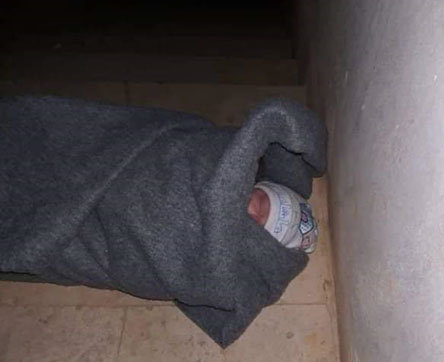
An abandoned newborn found near a residential building in Idlib in November 2018. Photo credit: local social media pages.
STJ field researcher in Idlib documented 8 cases of newborns and infants found abandoned in the streets of the cities and towns of Arihah, Ma’arrat Misrin, Saraqib, Haram, Salqin and Idlib city. 4 of those found had already died for being placed in plastic bags or travel bags or because of the bad weather or lateness in finding them.
STJ confirmed that the true figure of abandoned infants in Idlib is likely much higher.
With respect to the surge in infant abandonment, the social scientist, Fatima al-Ahmad, spoke to STJ saying that the main causes of this phenomenon are poverty, which the war has pushed the society into, and the issuance of no law protects the parents who confess their abandonment to their children. Further, such cases are sensitive in our community, as it is considered a stigma and put the life of the mother at stake, especially if the abandoned children born outside marriage.
lack of awareness and culture has also contributed to the spread of this phenomenon. And on top of it all, the forced marriages of under-age girls to foreign fighters, whose identities unknow. Children from this kind of marriage were mostly abandoned by mothers because they can’t provide maintenance for them, especially after their spouses killed in combat. She added:
“The sharp rise in infant abandonment indicate the existence of a humanitarian, social and moral crisis in society. Those innocent creatures are either killed or live as stateless and social outcasts.”
2. Abandoned newborn baby girl found alive in a travel bag
On June 15, 2019 Khalid Abu Khattab, a resident of the village of Jarjanaz in Idlib found an infant girl abandoned in street in a travel bag. Regarding this he talked to STJ saying:
“I was walking home with my brother and son, when we saw a travel bag ditched at the entrance to the village. At first, we thought it contained an explosive device, as planting IEDs on roadsides is common in our area, so we feared getting closer and resumed our walking. But, nevertheless, I got curious and went back to it. The bag was half closed, I shook it and shocked to hear baby cries. I promptly opened it and found a baby girl inside; it was about a week-old, wearing a small shirt. I took it home and informed the police about it; they wrote a report on the incident and ordered the baby a medical check.
Khalid’s family decided to foster the infant on compassionate grounds. His wife gave it the name Hiba (in English means gift) and was happy to take care of it as a member of her family. She said to STJ:
“We are looking after this little girl as if it is our own. We named her Hiba, because she is a godsend. Unfortunately, we couldn’t register her in the personal status department due to the known difficulties, and that makes me worried for her life and future. I’ll definitely keep taking care of her until she grows up. I will tell her then that her real parents were killed when their house was bombed. I want her to know nothing about being put in a travel bag.”
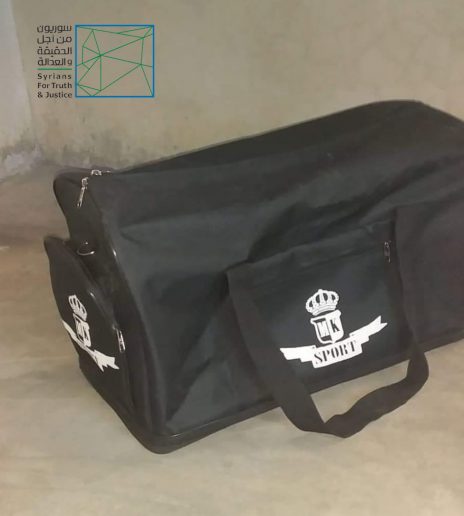
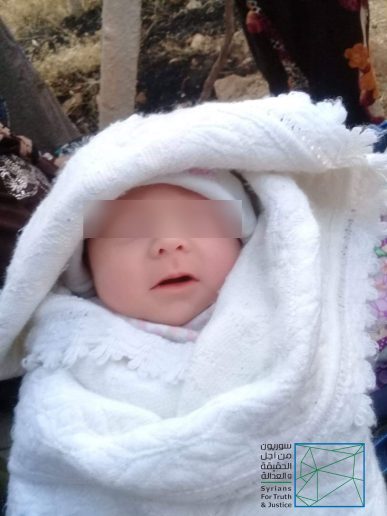
The girl found in Jarjanaz and the bag she was put in on June 2019. Photos credit: the witness Khalid Abu Khattab.
3. “Never a month goes by without one or two infant abandonment cases”
Similar cases of that mentioned above occurred previously in Idlib during 2019. A media activist confirmed to STJ that more than 10 infants were found abandoned in Idlib streets since the beginning of 2019 through July 1 same year, some of whom were already died while others fostered by families. The activist told STJ about a newborn abandonment in the town of Salqin early 2019:
“Never a month goes by without one or two infant abandonment cases in Idlib. In the early morning hours of January 29, 2019, a newborn wrapped in a white cloth was found abandoned in the town of Salqin near a house. It was immediately taken to a medical post since it was about to die from the bitter cold. A family then fostered it but, however, wasn’t able to get it registered in the personal status department which cannot be accessed owing to the fear of arrest since it is located in the regime-held areas. We don’t know if it will be given identity documents in the future.”
Abu Muhammad, a resident of Salqin, went to the medical post and ask if he could foster the baby girl. They told him that he had to wait 24 hours until they finish the necessary medical tests. He spoke to STJ saying:
“I have three children, though I fostered the baby girl, since I have a grocery shop and my financial situation is fairly good. The girl is now living with us and she is completely healthy. I named her Asma’a and she became a member of my family. It wasn’t her fault being born in war and in such dire conditions; we can’t be heartless or inhuman. What really upsets me being not able to register her birth neither in the local personal status departments, for the adoption is banned in Islam, nor in the civil status directorate in the regime areas, given it’s dangerous to go there. The girl now doesn’t have any official papers.”
4. Insufficient action and unknown fate
Syrian law defines the ‘foundling’ as an abandoned child of unknown parents who is found by somebody.[3] The terminologies; child of unknown decent and ‘founding’ are often confused, as the former has a Syrian mother and a disappeared foriegn father with nothing proving their marriage, while the latter granted the nationality of the country it was found in, as explained by the media activist Mohammed Nour Hamidi, from the town of Arihah in rural Idlib.
The activist added that the fate of many abandoned children still unknown and the number of cases is on the rise amidest the authoroties’ inaction. However, activists are making individual efforts to deal with the situation, as they liaised with the directorate of education of the Salvation Governement to accept the abandoned children in schools, and after negotiations they were admitted only as ‘listeners’, means not entitled to certificates, since they are not registered and have no civil documents. He also noted that some charitable organizations strive to provide care and education to the children who are not fostered by families, by placing them in retirement homes or orphanages in the province. Right activists are still trying hard to reach out a United Nations organization to help in building a shelter to those abandoned children and in securing their future.
According to STJ field researcher, when abandoned infants found they are taken to the medical centers in Idlib to receive the necessary first aid. They stay in the medical centers for several days before being fostered, mainly by families who lost their sons in war or those who can’t have kids. The abandoned child’s status documented at a police station or at the sharia court, which handles the procedures of delivering the child to its foster, amidst a complete absence of the relevant authorities’ role to reduce this phenomenon in the province or to establish care centers for abandoned children or even to allow their registration in the local personal status departments, since adoption is not allowed in Islam.
5. Increased cases of infant abandonment in northern rural Aleppo IDP camps
Just like Idlib, Northern rural Aleppo saw surge in infant abandonment, for the same reasons, including mainly living in poverty, according to witnesses.
This phenomenon arose in northern rural Aleppo early in 2017, particularly in the cities and towns of Jarabulus, Marea, Akhtarin and Suran. However, it later prevailed dramatically in the cities of A’zaz and Al Bab and their surroundings, specifically those close to the Turkish border, where the IDP camps located. The infant abandonment phenomenon spread more widely with the increased scope of the Turkish-backed National Army’s control. STJ researcher was able to document no less than 7 cases of babies found abandoned in streets as of 2018, and at least 3 similar cases since the beginning of 2019 as of the date of preparing this report, July 1, 2019. Some of those found were placed naked next to sewage lines and others were with the umbilical cord attached.
On the morning of June 6, 2019, the young man Mustafa Abu Ahmed-an alias- found a few-hours-old newborn abandoned under an olive tree on the road between Al Harameen Camp and the city of A’zaz in northern rural Aleppo. Mustafa detailed STJ about the incident saying:
“The baby’s face was covered with blood, so I rushed it to the nearest medical point, where it got cleaned up and then transferred to Al-Hilal al-Azraq hospital at Bab al-Salam border crossing to be checked and placed in an incubator, waiting for the police to initiate an investigation into its case in a try to find its real parents. But, however, it was all pointless and a displaced family from Homs fostered it.”
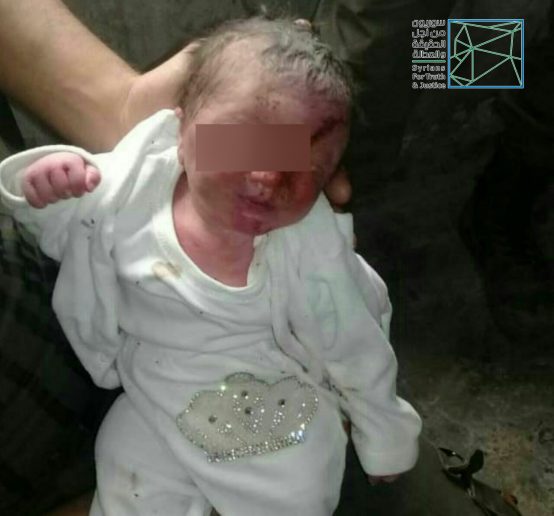
The dire conditions in which the baby was abandoned and the critical situation it was in. Photo credit: the witness Mustafa Abu Ahmed.
In another incident, a resident of a village in northern rural Aleppo, found a baby girl on the morning of January 25, 2019, near the sewage lines, specifically near al-Rayyan Camp. Regarding this, STJ talked to Khadija M., who fostered the baby, and she said:
“My husband recounted that, while he was on his way to work, he heard baby cries from the right side of the road. He stopped and looked there to find a naked baby girl with umbilical cord still attached, covered with a cloth and ditched near a sewer line from where bad drain odors emanate. He immediately took her to the A’zaz Al Ahli Hospital, where she had her umbilical cord cut and her health was examined. The doctors estimated her to be only three-hours old. My husband felt bad for this baby and decided to adopt her, despite having five children and two wives. He headed to the personal status department and register her on his name, giving her the name Amina. Then, he brought her to me because, unfortunately, I am infertile. When I saw her, I was thrilled but felt so sad hearing her story. Now she is five-month old and I will keep taking care of her until she grew up. I don’t know if I will tell her the true story of her abandonment or not. It’s her right to know her real mother, but I don’t want her to stop calling me mom.”
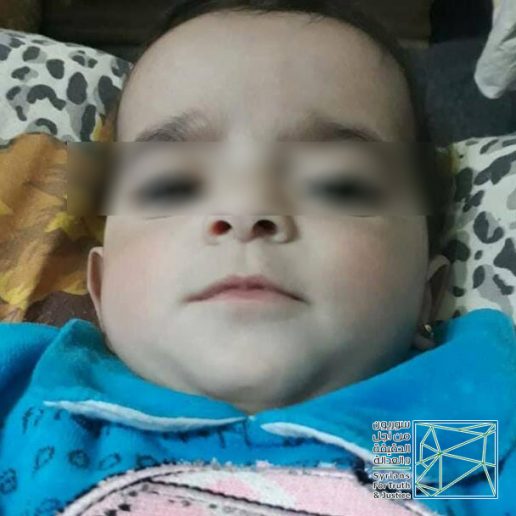
The baby girl found abandoned near al-Rayyan Camp. Photo credit: the witness Khadija M.
6. Poor living conditions contributed to the spread of infant abandonment in regime-held areas:
Areas controlled by the Syrian government also witnessed an increase in child abandonment due to the worsening living conditions, specifically Damascus and its surroundings, as reported by several news websites in March 2019. Local media outlets reported the news of a newborn abandoned, by his father, at the door of the Althagafi Mosque in Al-Qassaa neighborhood in Damascus. The police have been able to arrest the father who confessed his crime citing the poor living conditions which make him unable to feed her or ensure her medical treatment.[4]
Judicial source told the pro-government Al-Watan newspaper, that some 300 cases of children of unknown parentage recorded by the Palace of Justice in Damascus, during the war years, at an average rate of 2 per two months. The same source added that when an abandoned child found, it is taken to the police station immediately to write a report describes the incident. This report then referred to the public prosecutor’s office, who in turn refer the child to the relevant department in the Ministry of Social Affairs and Labor, which is responsible for checking the child’s health and for its civil registration. The Civil Register chooses names for the child and his parents. The source asserted that the abandoned child enjoys its full civil rights and only the civil record knows of its abandonment.[5]
STJ’s legal advisor said that the ongoing Syrian conflict resulted in poverty, displacements and low living standards at social, financial and political levels. Cases of infant abandonment prevailed in several regions in Syria, and even if those infants got fostered, they couldn’t be registered officially or obtain identity documents in some areas for several reasons, including the ban of adoption, which means their inability to access their civil rights or to live a normal life.
She added that the People’s Council of Syria had discussed in 2018, a draft law on the abandoned children which included 57 articles. The aim of this law is to guarantee the rights of all abandoned children, defend their interests and ensure their equality in rights and duties with the legitimate children. The law is also designed to protect them from abuse, discrimination, violence, physical or mental harm, exploitation, inhuman treatment or neglect. Article III of this draft law states that this law would be apply to a newborn or a child who has not yet reached the age of seven and whose parents are unknown, also to the child who got lost and isn’t able to get back to his family for being too young to speak and tell his house’s address or for being weak minded, deaf or mute. The draft law stated in Article IV that the Ministry must provide foster care and education to abandoned children until he/she is able to handle himself. Article V, indicates that government would provide care for the abandoned children as needed at the request of the Ministry of Social Affairs and Labor, which is responsible for supervising and managing the government’s activities and their efficiency in the area.[6]
The draft law is still under discussion and it has not yet been passed, despite the urgency, as there are reservations on some of its articles which need modification.
She noted that the ‘waif’ or the ‘foundling’, words must be no longer in the vocabulary of the resolution. They should be replaced with child of unknown parentage or abandoned child. The legal advisor drew attention to the need for the amendment of the personal status and civil laws to allow adoption and to place the DNA fingerprint on ID cards to be able to know the real fathers of those abandoned and to limit this phenomenon.
7. Recommendations and proposals
To the security authorities in opposition-held areas and relevant humanitarian organizations:
- Cases of abandoned newborn babies in the armed opposition-controlled areas must be, at least, documented by relevant humanitarian organizations.
- Relevant bodies must enact legislation and laws that guarantee those children’s rights and work on establishing care centers for them.
- Authorities must allow the registration of those children in local councils or personal status departments to ensure their access to documentation that proves their identity and nationality, even if recognized only locally.
- Keep supporting abandoned children and protect them against violations and abuses as they get older, by, for instance, establishing appropriate commissions responsible for overseeing the lives of those fostered and imposing conditions on the foster to assure the child’s access to the essentials of life.
——————————–
[1] Northern rural Aleppo is controlled by the Turkish-backed National Army, as it managed to seize Afrin city and Jindires town following the operation Olive Branch on January 22, 2018, and later took the cities of Jarabulus and Al Bab in the operation Euphrates Shield on September 5, 2016. The Turkish-backed National Army consists of the groups of the Sham Front, the Sultan Murad Division, Northern Storm Brigade and Ahrar al-Sharqiya.
[2] “2018 deadliest year yet for children in Syria as war enters 9th year”, UNICEF, March 11, 2019 https://www.unicef.org/press-releases/2018-deadliest-year-yet-children-syria-war-enters-9th-year.
[3] For more info on the Legislative Decree No. 107 of 1970 on providing care for abandoned children and regulating their issues according to the Syrian law, please check the link below:
https://www.mohamah.net/law/%D9%86%D8%B5%D9%88%D8%B5-%D9%88-%D9%85%D9%88%D8%A7%D8%AF-%D9%82%D8%A7%D9%86%D9%88%D9%86-%D8%B1%D8%B9%D8%A7%D9%8A%D8%A9-%D8%A7%D9%84%D9%84%D9%82%D8%B7%D8%A7%D8%A1-%D8%A7%D9%84%D8%B3%D9%88%D8%B1%D9%8A/.
[4] “Abandoned babies on the rise in Damascus and suburbs… unlawful relationships on the top of causes”, 7al, March 26, 2019. https://7al.net/2019/03/26/%D8%A7%D9%84%D8%AA%D8%AE%D9%84%D9%8A-%D8%B9%D9%86-%D8%A7%D9%84%D8%A3%D8%B7%D9%81%D8%A7%D9%84-%D8%AD%D8%AF%D9%8A%D8%AB%D9%8A-%D8%A7%D9%84%D9%88%D9%84%D8%A7%D8%AF%D8%A9-%D8%A7%D9%84%D8%AD%D8%A7%D9%84/.
[5] “300 children registered of unknown parentage during war… yet having full access to their rights and the judicial guarantee keeping their reality”, Al Watan newspaper, March 19, 2018 http://alwatan.sy/archives/143738.
[6] “The People’s Council of Syria continue to discuss the draft law of abandoned children” SANA, June 12, 2018 https://www.sana.sy/?p=766785.

